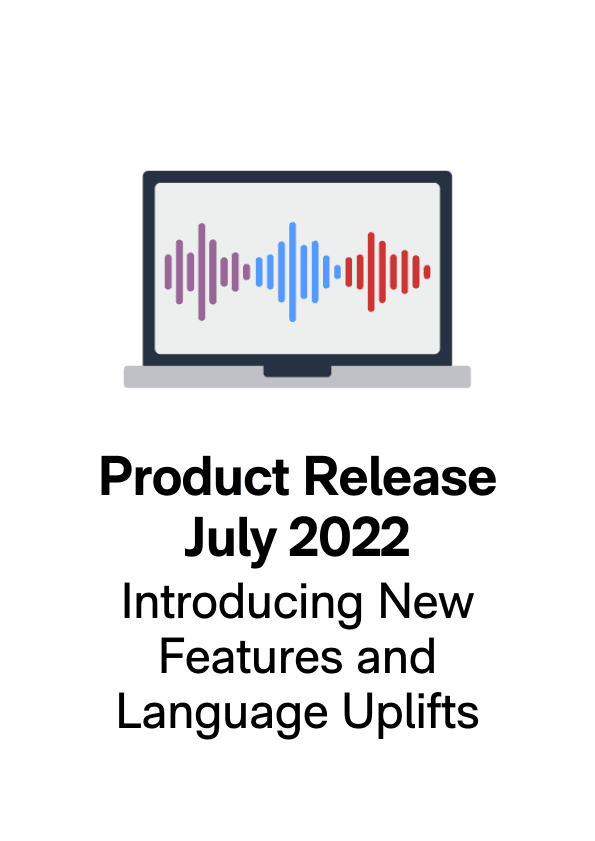- Blog
- Product Release July 2022: Introducing New Feature...
Jul 28, 2022 | Read time 3 min
Product Release July 2022: Introducing New Features and Language Uplifts
We’re excited to bring to our customers our latest product release, including language uplifts and Language Identification feature.
This July, we’re excited to bring our customers our latest product release. Our world-leading speech-to-text engine has improved accuracy across major languages, we’ve updated our Advanced Punctuation to support readability, and we now boast impressive new features including our Finance Domain Language Pack and Language Identification.
Opening New Doors for ASR and Finance
One of the headline acts for this release is our Finance Domain Language Pack for English, providing accuracy improvements where financial terms and jargon are spoken. For use-cases including compliance, fraud identification, analytics, financial news, and earnings calls, this addition allows our speech-to-text engine to identify finance terminology in conversation, including abbreviations, acronyms, and finance-specific terms.
Coupled with our Entity Formatting feature, (detailed in this year’s first product release) you’ll see for yourself just how well Speechmatics is serving the financial industry. With customers already using this language pack to transcribe financial news and earnings calls, and to aid contact center analysts and traders, it won’t be long before we release language packs for other industries, like medicine and law.
Key Language Improvements
Next up, we've improved the accuracy for both French and Portuguese. We focused on improving our Canadian French (fr-ca) and Brazilian Portuguese (pt-br) within the existing language packs. You can see our latest benchmarking against our competitors in this area, in this article. Without spoiling the results too much, we found we’re way ahead of our competitors in both our Enhanced and Standard models.
We’re also thrilled to announce we’ve added another language in this release, taking our total figure of supported languages up to 34. Language number 34 for Speechmatics is Ukranian. This will be supported by many of our additional features, including Advanced Punctuation. Watch this space for more languages to come.
Speaking of Advanced Punctuation, we’ve updated 16 of our languages to support additional punctuation marks and improve readability. The following languages now support full stops, commas, question marks, and exclamation marks: Bulgarian, Catalan, Czech, Greek, Finnish, Croatian, Hungarian, Lithuanian, Latvian, Norwegian, Polish, Romanian, Slovak, Slovenian, Ukrainian, and Korean.
Throughout the release we’ve updated many of our supported languages to increase accuracy, improve the written output of numeric entities, and remove undesired characters. For Batch Container customers, we’ve updated Speaker Diarization to utilize multiple cores in parallel, increasing performance for transcription speed and RTF. Additionally, Speaker Diarization has a new sensitivity parameter to fine-tune how speakers should be detected.
You can find many more details in the release notes for Batch Containers and Real-time Containers, and if you need any additional support, please contact our Support team.
Our Language Identification Feature is Here
Finally, we're pleased to announce the first release of our Language Identification Container, allowing you to identify the predominant language spoken in any media file. Our Language Identification is perfect for when users aren't completely sure of the language in a piece of audio. Now you can save time and effort checking the language, safe in the knowledge that you'll be able to submit a speech-to-text request already knowing the predominant language in the file.
This initial release of Language Identification will be available through its own Docker Container. This release will identify 12 languages, with a confidence score identifying the most likely language and providing scores for other potential languages identified.
For more information on how to use the Language Identification Container, you can read our documentation.
That’s plenty to be getting on with. Now we'll start prepping for the next release. See you then.